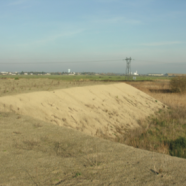Sinking trees
The Goro Nickel project in New Caledonia is catastrophic for the marine environment and coral reefs. The project is also disastrous for the terrestrial environment. The forest fires in New Caledonia demonstrate the insufficient means and techniques at human disposition to fight against the catastrophies. This insufficiency on land also holds true for the ocean and coastlines. The black chemical tides generated by the arrival of raw materials and Goro Nickel mine exportations would not be counteractable. The Polmar plan (Marine Pollution Plan) and means in New Caledonia are laughable.
Whales in the mud
The New Caledonia project conducted by the Canadian mining company Inco, known in Canada and Central America for infractions against human rights and the environment, must immediately be stopped by the French government, specifically the Minister of Finances, who contributes to the project, as well as the Minister of Ecology, who is responsible for the protection of biodiversity in New Caledonia.
“Goro Nickel”, a project conceived entirely by Inco, expects to produce 50,000 tons of nickel and 5,400 tons of cobalt a year by 2007/2008 via an experimental technique that uses sulfuric acid under high pressure, the storage of dangerous goods and mining residues, dozens of radioactive sources, and the contamination would mire the coral reefs and the depending fish in the lagoons of southern New Caledonia. The proposal for this preserved ecosystem to gain World Heritage status was withdrawn by France in October, 2002. The Minister of Ecology stated, “The status is useless because it isn’t binding, and it will be more effective to protect the environment by working with the mining companies.”
The subterranean canal and the combined nickel and cobalt refining is expected to reject a flux of 45,000m3/day containing among others several tons of suspended materials, manganese, copper, aluminium, zinc, iron, arsenic, cadmium, organic substances, sulfates, and chromium into the ocean.
In their critical analysis of the request for authorization, INERIS* attempted to bridge the gaps in the studies of the impact concerning the quasi-totality of the project and the long-term prediction of the effects of bioaccumulation of the pollutants on the marine species. The sanitary effects of marine food-chain contamination—there are hundreds of small-scale fishermen working in the zone—are no longer addressed.
The lagoons threatened by the toxic influence of Inco are vital areas for multiple marine mammals of two orders: sirenias with the sporadic observation of dugongs, and cetaceans—blue whale, minke whale, sperm whale—perhaps the most important of which, the humpback whales of the South Pacific who migrate between the Tonga Islands, New Zealand, Australia, and New Caledonia. These populations are strictly protected by international convention, which has prohibited humpback whaling since 1966.









